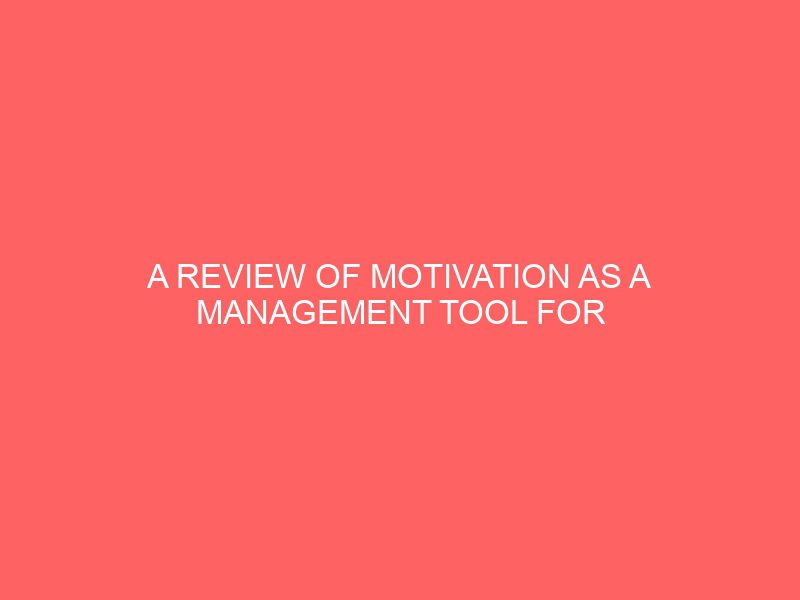Description
A REVIEW OF MOTIVATION AS A MANAGEMENT TOOL FOR INCREASING THE PRODUCTIVITY OF EMPLOYEES
ABSTRACT
This research examines “the review of motivation as a management tool for increasing the productivity of employees, a case study of Emenite Limited, Emene, Enugu State. The researcher adopted descriptive survey design. The population of the study is 224 while the sample size is 144. The researcher used both primary and secondary sources of data. In view of this, four research questions were formulated to generate expected answers. Literal works were reviewed for proper understanding and guidance. Questionnaires, personal interview and observation were used for collection of primary data. Secondary sources of data were collected from textbooks, periodicals, articles and journals. Tables and simple percentage were used for data presentation and analysis. Based on the findings, the researcher found out that salary increase, fringe benefit, regular training, promotion and favourable working conditions are good motivational technique. The management of Emenite Limited adopts various motivational techniques including roofing and ceiling their staff houses at a cheaper rate. Finally the researcher proffered among others prompt payment of salary to their employee that will improve motivation in the company.
CHAPTER ONE
INTRODUCTION
1.1 BACKGROUND OF THE STUDY.
In every organization, large or small, private or public enterprise, human resources (employees) are always the pillar to the success of the organization. These human elements have their individual drives, desires, needs, wishes and similar forces which they intend to satisfy when they are coming into an organization. Satisfaction or non-satisfaction of these needs by the organization has an impact on the behaviour or performance of the employee and eventually on productivity.
The usefulness of motivation cannot be over emphasized. Every organization depends on motivation amongst other factors for the attainment of their objectives. Organizational objectives cannot be fully achieved unless the employees are trained and motivated to acquire the necessary skills, knowledge, and ability to perform their jobs effectively and efficiently. With the drive towards technological advancement in Nigeria, motivating and training of employees are inevitable, the monetary incentives like bonuses, wages, salary increment etc. are to motivate the employees thereby making them to put more effort in their work which help to improve the level of productivity in both private and public industries.
Motivation is defined differently by different authors. According to Koontz and O’Donnell (1980, p.334), motivation is defined as a means of inducing people to act in a desired manner. Also Pinder (1984:24) defines motivation as the force within a person that affects his or her direction, intensity and persistence of voluntary behaviour.
The major problem of motivation is how to induce a group of people, each with a distinctive set of needs and a unique personality to work together towards the achievement of organizational objectives. The ability to understand why people behave the way they do and the ability to motivate them to behave in a specified desired manner are two inter related qualities which are very important for managerial effectiveness.
Luthans (1998:8) posits that motivation is the process that arouses, energizes, directs and sustains behaviours and performances. That is, it is the process of stimulating people to action, being committed towards achieving a desired objective, one way of doing this is to employ proper motivational technique which makes workers more satisfied with and committed to their job.
The most concern of employer is to make the employees to contribute to the attainment of organizational objectives, but they should know that if the employees are not happy with the management of the organization; there will be a very low rate of production in the organization. That is why Hekina and Jones (1967)
visualize that employees should be seen and valued as assets for the allocation of organizational resources. This project will be based on the review of motivation as a management tool for increasing the productivity of employees using Emenite Nigeria Plc., Emene as a case study.
1.2 STATEMENT OF THE STUDY
Organizations do not lay emphasis on the importance of understanding and applying various proper motivational techniques in designing and creating an environment for performance leading to productivity.
This research work problem is to find out how motivation can bring about increase in productivity in an organization on the basis of information which i have found out, I will make recommendations for the problems.
Many organizations are apparently unaware of the benefits derived from motivating their employees, this makes their performance to be very poor and the problems here are:
1. Organizations see motivating their workforce as something not too important because they do not value the employees in their organization;
2. Organizations lack an enabling environment for work performance, poor incentives, tribalism and sentiments, bureaucracy and quota systems helps in contributing to poor performance in an organization.
3. Organizations see motivating their employees as a waste of time and money and even if some are trained, some of them are adamant to change.
1.3. OBJECTIVES OF THE STUDY.
The general objective of this study is to review motivation as a management tool for increasing the productivity of employees in Emenite Limited. Meanwhile, other objectives of this study will include:
1. To examine the motivational techniques applied by the management of Emenite Limited to enhance the productivity of its employees.
2. To know the impact of motivation on workers’ productivity in Emenite
3. To find out how the present situation can be improved.
4. To determine the extent of the impact of the motivational strategies used on workers’ productivity in Emenite.
5. To suggest ways and make adequate recommendation on increased workers’ productivity in private and public sectors.
1.4 RESEARCH QUESTIONS.
This part is aimed at helping the researcher to adequately address the research problem and also to investigate beyond what is already known for the purpose of this research, seven research will be maintained as follow;
1. To what extent is motivation beneficial to organizational productivities?
2. What are the impacts of the motivational techniques on employee’s performance?
3. To what extent does effective training and development of employees influence the level of productivity?
4. What are the factors affecting productivity in Emenite.
1.5 SIGNIFICANCE OF THE STUDY.
This study is significantly important to the following sectors:
1) Management experts and policy makers: it would enable management experts and policy makers in the formulation and implementation of policies internally; it will benefit the management and staff as well as the shareholders. Through this study, managers will be informed of various motivational factors that are helpful in obtaining improved work performance by the employees:
2) Future researchers: it will help the future researchers to know about those motivational strategies in Emenite Nigeria Plc. and changes that could be made for better; and also to enable the researcher have thorough idea of how motivation can improve productivity in Emenite Nigeria Plc. Enugu.
3) The staff: the staff stand to benefit by availing them the opportunity for self-motivation and work performance.
4) The government: the significance are beneficial to government in its policy formulation and review of existing laws, regulations and bye laws for achieving maximum efficiency and productivity. The organization is interested in improved work performance of her employees as a way of enhancing profitability. Thus it would attain growth through improving the workers motivational factors of efficiency.
1.6 SCOPE OF THE STUDY.
This research study will cover motivation as a management tool for increasing the productivity of employees in Emenite Limited Located at Emene, Enugu state in the Eastern region of Nigeria within the period of the year 2012.
1.7 LIMITATION OF THE STUDY.
Some limitation that were identified and encountered in the process of the study includes:
1. Financial constraints: in running around to gather materials for this study, considering the economic meltdown, money and other resources were involved which delayed the completion of this work.
2. Attitude of Respondents: the researcher found it difficult initially to source required information from the members of staff of Emenite Nigeria plc. This also delayed the completion of this work.
3. Time and effort: the researcher was constrained by time and effort in running round for the completion of this project.
4. Electricity: the researcher had a hard time in typing, proof reading, editing, and printing of this work due to the incessant seizure and interruption of power supply by power holdings limited
1.8 DEFINITION OF TERMS
WAEC: West African Examination Council
GCE: General Certificate of Education
NECO: National Examination Council
B.Sc.: Bachelor of Sciences
HND: Higher National Diploma
MBA: Master of Business Administration
MSc: Master of Science
PhD: Doctor of Philosophy
OND: Ordinary National Diploma
NCE: Nigeria Certificate in Education







Reviews
There are no reviews yet.